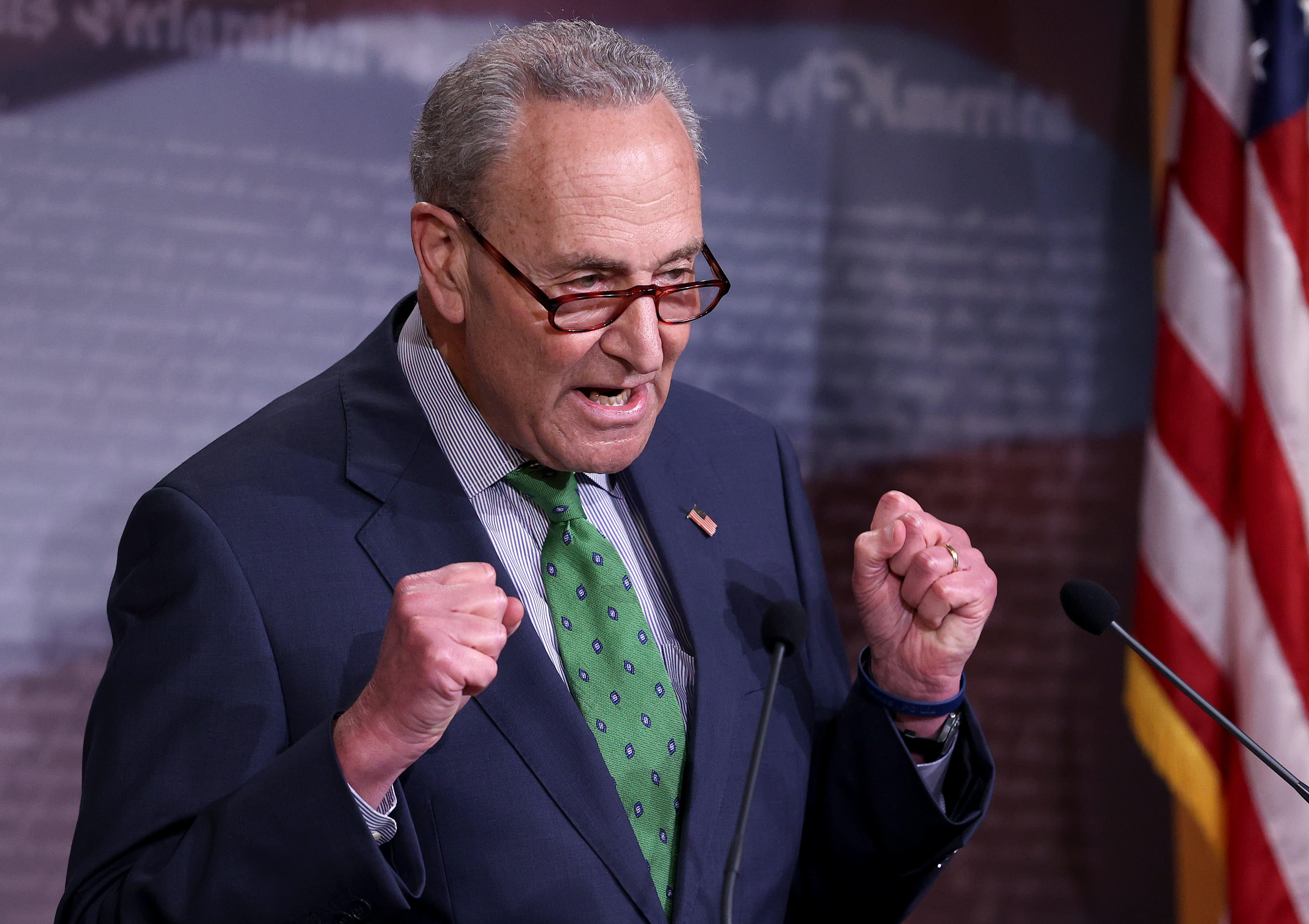
Senate Minority Leader Chuck Schumer voiced opposition to a Republican coronavirus stimulus plan Thursday, assuring the impasse over more pandemic aid will drag on for days.
In a letter to his caucus, the New York Democrat argued a bill the GOP-held chamber aims to consider next week does not go far enough to mitigate damage from the outbreak. The legislation, which is expected to cost $500 billion, would offer more narrow relief than other plans currently on the table, CNBC previously reported.
“Republicans may call their proposal ‘skinny,’ but it would be more appropriate to call it ’emaciated.’ Their proposal appears to be completely inadequate and, by every measure, fails to meet the needs of the American people,” Schumer wrote to Senate Democrats.
“With no money for rental assistance, no money for nutrition assistance, and no money for state and local services, the census, or safe elections, [Majority] Leader [Mitch] McConnell and Senate Republicans would be making another unacceptable and ineffective attempt at providing relief,” he continued.
A spokesman for McConnell declined to comment on Schumer’s letter.
Efforts to pass a fifth coronavirus rescue package ground to a halt last month as Democratic leaders and the White House accused the other side of the negotiating table of being intractable and unrealistic. As an employment crisis lingers and the virus spreads, the parties have disparate views on how much money the federal government needs to spend to boost the U.S. economic recovery and fight the outbreak.
Senate Republicans have not released the final version of their bill. Sen. John Barrasso of Wyoming, the third-ranking GOP senator, told reporters Tuesday that “the goal” is to vote on a “focused, targeted” solution next week.
As of late last month, the plan was expected to include enhanced unemployment insurance, more small business loans, funding for schools, and money for Covid-19 testing, treatment and vaccines. Republicans aimed to include policies both parties support, disregarding Democratic priorities such as state and local government aid and rent and mortgage assistance.
The Republican legislation would set extra federal jobless benefits at $300 to $400 per week. The sum would drop from the $600 per week payments which expired at the end of July. Democrats have pushed to reinstate the $600 per week policy.
The bill follows a roughly $1 trillion plan the GOP released in late July. Democrats, who pushed a more than $3 trillion package through the House in May, have called for Republicans to increase their stimulus offer to $2.2 trillion. The White House has so far not gone higher than about $1.3 trillion.
House Speaker Nancy Pelosi, D-Calif., spoke to Treasury Secretary Steven Mnuchin on Tuesday. After the phone call, Pelosi said the sides “continue to have serious differences understanding the gravity of the situation that America’s working families are facing.”
During congressional testimony on Tuesday before he spoke to Pelosi, Mnuchin appeared to endorse the Senate GOP approach of passing a limited plan. He said he and President Donald Trump want to “move forward on a bipartisan basis on points we can agree upon.”
As Senate Republicans debate how much more money the federal government should put into the pandemic fight, it is unclear how many votes the GOP bill will get.
The debate over additional aid comes as the job market shows signs of improving. The Labor Department on Thursday reported 881,000 new jobless claims last week, a better-than-expected figure that nonetheless tops the pre-pandemic record.
The monthly employment report due Friday will show whether the U.S. in August sustained a rebound from record job losses in the spring.
Meanwhile, new Covid-19 infections in the U.S. have started to decline, despite problem spots in the Midwest.
Still, the economic pain from the pandemic has intensified for some amid improvements in the broader economy. Millions of Americans are unemployed, and the expiration of the extra unemployment benefits and a federal moratorium on evictions has hurt people already reeling from job losses.
Despite the roadblocks to legislation, officials in Washington have started to show more urgency to pass aid ahead of November’s election. About half of the House Democratic caucus previously urged Pelosi to take up a stand-alone bill to refresh federal unemployment benefits.
The Trump administration also moved this week to halt evictions until the end of the year using Centers for Disease Control and Prevention powers.
Congress has a lot on its plate when lawmakers return from their recesses. The legislature also has to fund the government by Sept. 30 to avoid a shutdown. Lawmakers could potentially include coronavirus relief provisions in must-pass spending legislation.




